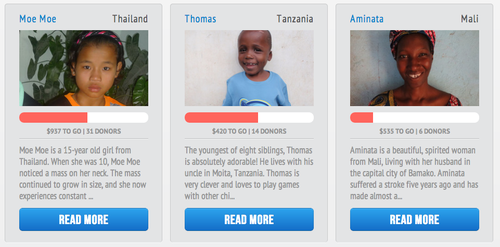Helping Specific People |
May 1st, 2013 |
| ea |
Which makes Watsi very interesting. You look through listings of people who need assistance, with pictures and descriptions of their need, and then you donate to helping a specific person. And your money really does go to help the specific person you think you're helping. [1]
Update 2013-05-03: Jeremy points out that this isn't completely true anymore:As a result of these learnings, we instituted our current policy, which operates as outlined below:There's still more of a connection in the sense that the people whose profiles you see are the people Watsi currently works with not just representative samples, but everyone one the site has already been treated and their care will be covered even if you don't donate, so the actual effect is that you're funding the treatment of the people Watsi will post on the site later. This makes it similar to Kiva.
- The patient is diagnosed and their profile is submitted to Watsi.
- Watsi confirms that the profile meets our criteria, notifies the Medical Partner that it has been accepted, posts it online, and donors fund it.
- The Medical Partner provides care to the patient as necessary, operating under the guarantee that Watsi will reimburse them for the cost of care.
- The Medical Partner submits a treatment update to Watsi, verifying that the treatment has been provided.
- Watsi transfers funds to the Medical Partner as soon as the patient's profile is fully funded.
I think this is great. Which might be surprising because I'm generally stressing the importance of effective giving and recommending donating to GiveWell's top charities. But the important thing here is that Watsi is good at motivating people to give. [2] These mostly aren't dollars that would otherwise [3] go to the top charities, these are dollars that people wouldn't have been donating at all. Getting people thinking about what their money can do to help others and how much further their money can go in developing countries are both really positive.
[1] Their FAQ
answers this well, plus they have an amazing transparency
spreadsheet where they list details on every single funded
treatment.
[2] Couldn't you also say that donor illusions are good because they also motivate people to give more? I think the issue is why it motivates. In the case of donor illusions you're misleading people about the effect their donation will have, which is part of a very dangerous dynamic in charitable giving.
[3] This is sometimes called "funging", as in, "what does that funge against?" It's related to fungibility.
Comment via: google plus, facebook, substack
